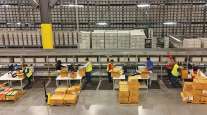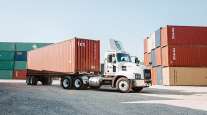Senior Reporter
Senate Panel Examines Supply Chain Disruptions

[Stay on top of transportation news: Get TTNews in your inbox.]
WASHINGTON — To help alleviate ongoing supply chain woes, a senior transportation policymaker in the U.S. Senate suggested federal agencies as well as industries look to ports along the Great Lakes.
Sen. Gary Peters (D-Mich.) said commerce in his home state and the region has been affected by recent large-scale disruptions to the flow of freight. He attributed much of the supply chain crisis to the COVID-19 pandemic.
“Throughout the past year, I have heard from small businesses, across multiple industries, about the significant delays and problems they and their supply chains are facing, specifically as they relate to ocean shipping,” Peters said during a Surface Transportation, Maritime, Freight and Ports Subcommittee hearing on Dec. 7. He chairs the subpanel.
“The multifaceted challenges facing our supply chains require a holistic response from all sectors, including from ports, where I believe Great Lakes ports can play a significant part in reducing backlogs,” Peters continued. “As we explore solutions to strengthen our shipping and supply chains, we must be sure to look to the Great Lakes, our nation’s third coast, to help fill in gaps when possible.”
Earlier this year, Peters introduced the National Institute of Manufacturing Act, which aims to improve freight connectivity by establishing a one-stop online resource to assist how manufacturers access federal resources. The legislation awaits consideration.
Peters and fellow Democrats also tout President Joe Biden’s response to the supply chain crisis. The response from the White House has included establishing a task force to address private sector concerns.
Republican transportation policymakers continue to blame aspects of the Biden administration’s policies for supply chain disruptions. At the subcommittee hearing Sen. Roger Wicker (R-Miss.), the Commerce Committee’s top Republican, urged Democratic leaders to schedule hearings with senior administration officials overseeing the supply chain.
“These transportation bottlenecks show no signs of letting up. High levels of freight congestion are expected well into next year. I have heard from many supply chain stakeholders about the complexity of moving such a vast amount of goods, and indeed the situation is complex,” said Wicker. “We have all seen the images of ships waiting for miles offshore to unload their cargo. The lack of port terminal and warehouse space continues, as well as limitations on intermodal equipment, and workforce disruptions.”
The number of vessels waiting for a berth at the ports of Los Angeles & Long Beach remain at record levels, yet @POTUS claims numbers are decreasing.@SenatorWicker has voiced concerns about the Administration’s efforts to address these challenges. https://t.co/P4Um9gBEO6 — Senate Commerce Republicans (@SenateCommerce) December 7, 2021
Stakeholders, meanwhile, called on the subcommittee to prioritize policies designed to alleviate supply chain logjams. They emphasized that the complexity of the disruptions at freight distribution networks, which is threatening to decrease the availability of goods during the holidays, is solvable.
John Butler, CEO of the World Shipping Council, placed an emphasis on the private sector. As he put it, “The system is bent, but it is not broken. The supply chain challenges that we face require logistical and management solutions, as well as a return to a more normal volume and balance of import and export cargo, which will happen over time. Necessary solutions are being provided through the common purpose and efforts of many supply chain actors.”
Ian Jefferies, CEO of the Association of American Railroads, which represents freight rail operations, argued the path to greater connectivity will benefit from a joint effort from supply chain operators and users.
“Returning fluidity to rail networks will take time and require enhanced cooperation by all parties to determine which actions are needed to improve supply chain performance,” Jefferies said. “This is not a new way of operating for railroads; they work closely with their customers, transportation partners, policymakers and others on an ongoing basis to understand and meet expected service needs. Railroads will continue to work with these entities to find ways to solve these problems as quickly as possible.”
Greg Regan, president of the Transportation Trades Department at AFL-CIO, reminded senators of the role of labor: “The pursuit of a more efficient supply chain cannot be an excuse to eliminate or deconstruct critical regulatory safeguards, such as fatigue protections, or to water down carefully crafted training and qualification requirements.”
Happening Now: President Biden delivers remarks on his Administration’s work to strengthen the nation’s supply chains, lower everyday costs for families, and ensure that shelves are well-stocked this holiday season. https://t.co/lfv6rJBa3k — The White House (@WhiteHouse) December 1, 2021
As consumers take part in holiday shopping, the Biden White House has collaborated with logistics firms and ports to expedite the movement of freight containers. Doing so, the president has argued, would help to ensure retailers have timely access to their products.
“To help relieve congestion, I brought together labor and management and asked them to step up and cooperate more — to move toward operating those ports not five days a week, 40 hours a week; but 24 hours a day, seven days a week by adding more shifts at night and on the weekends,” Biden said this month. “Then we had to make sure people could transport those goods from the ports to stores and homes across the country. We’ve broken up logjams there as well.”
Want more news? Listen to today's daily briefing below or go here for more info:




